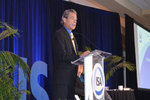
ISA past president Paul Gruhn, PE, CFSE, will be presenting at local meetings around the country during the first quarter of 2020. As a global functional safety consultant with aeSolutions, a process control and process safety consulting, engineering, and integration services company based in Greenville, S.C., Gruhn has gained extensive experience consulting with sites around the world.
Gruhn presented at the ISA Toledo, Ohio, section meeting on 14 January; the ISA Manchester, Conn., meeting on 29 January; the ISSS Northeast Chapter (Plantsville, Conn.) meeting on 30 January; and the ISA Brazos (Freeport, Texas) meeting on 6 February. He will speak at the ISA Wilmington (Newark, Del.) meeting on 25 February. Contact the meeting manager to attend.
If your group would like Gruhn to speak in your area, just ask. Gruhn says he has a long list of possible speaking topics he is happy to share. Below are the topics of his first six talks of 2020.
The Next Bhopal
Preventing disasters-and the incidents of lesser consequence leading up to them-requires probing beneath their seemingly superficial, distracting, and highly visible exteriors. Doing so shows how similar all industrial disasters are. The patterns that led to the Bhopal disaster are in many of the processes that we operate today. This presentation summarizes fundamentals of a portion of the Bhopal plant's process design, changes that were made contrary to the original specifications, problems encountered, and the numerous design and operational changes that were made (with the best of intentions) that simply led to further problems. It also covers how these issues came together to cause the worst industrial disaster in history. We need this awareness to prevent major industrial disasters and the more frequent "minor" process safety events that precede them today. This was the topic at the ISA Toledo, Ohio, section (14 January) and ISA Brazos (Freeport, Texas) 6 February talks.
Human-Machine Interface (HMI) Design
Poor HMI designs have been identified as factors contributing to abnormal situations, accidents, fatalities, and billions of dollars of lost production. HMIs often impede rather than assist operators. Although decades of research have identified better implementation methods, change is difficult, and people continue to follow poor design practices. Just as a computer is not a typewriter, new HMI designs should not mimic those of old. The problem is that many designers simply do not know any better. This presentation will review why certain HMI designs are poor (with many examples) and show how they can be improved. This was the topic at the ISA Manchester, Conn., (29 January) talk.
Process Industry Accidents
Using a collection of videos, photographs, and stories, this presentation covers lessons learned from a variety of process accidents. Topics include: Do not hire low bid (you get what you pay for); everyone needs training (yet they often do not get it or accept it); even trained people make mistakes (and sometimes they do really stupid things); we are not as immune or indestructible as we may think; reuse of software is not always successful; near misses are often not followed up; the past is often ignored (and history definitely repeats itself). This was the topic at the ISSS Northeast Chapter, Plantsville, Conn., (30 January) talk.
Process Safety Management
Subtitled "Jenga, Drift, and Preventing Process Industry Accidents," this talk covers many well-publicized process industry accidents over the past several decades. Much has been written about them, and many lessons learned have been proposed. However, evidence indicates that the number of industry accidents has not decreased. More recent realizations of the complexity of modern processes, and the organizations responsible for designing, building, running, and maintaining them, has brought a broader understanding of accident causation, and what can be done to prevent further incidents. This will be the topic at the ISA Wilmington, Newark, Del., (25 February) talk.





